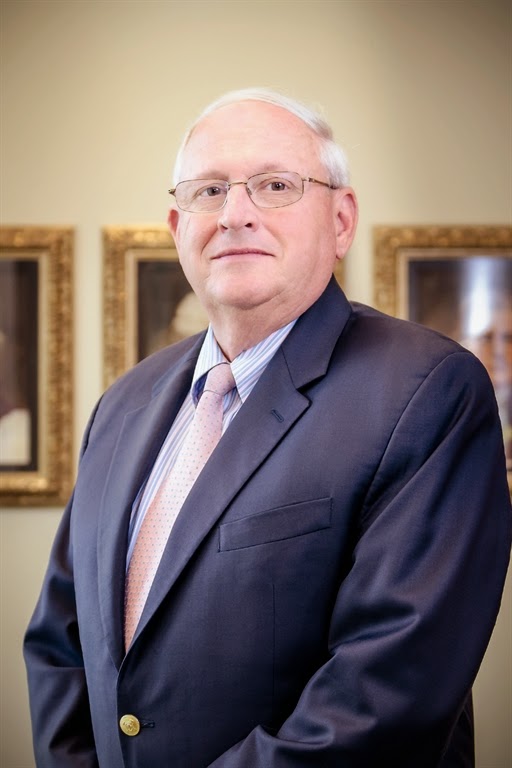- Public Policy
- Leadership
- Funding
- News & Events
- About the Center
Back to Top Nav
Back to Top Nav
Back to Top Nav
Back to Top Nav
This year’s Veterans Day Program Lecture featured Dr. W. Chris King, Dean at the U.S. Army Command and General Staff College. Before his talk, "International Environmental Security: What in the World is Worth Fighting For?," Courtney Wong ’15 sat down with Dr. King for an interview.
Dr. W. Chris King serves as the Chief Academic Officer of the US Army’s Command and General Staff. He earned his Ph.D. in environmental engineering at the University of Tennessee, published more than 30 journal articles and scientific reports as well as two books, and lectured at more than 50 professional conferences. He is a founding member of the Global Military Advisory Council on Climate Change. Dr. King retired from active duty after 34 years of commissioned service at the rank of Brigadier General.
 |
| Dr. W. Chris King |
Courtney Wong (CW): You received your Ph.D. in environmental engineering. What prompted you to enter the field and why?
Dr. W. Chris King (CK): My bachelor’s degree was in chemical engineering, but in my senior year I took an elective course on environmental engineering and very much enjoyed it. Then the professor of the class offered me a scholarship to get my masters degree in environmental engineering. He was an environmental engineer but needed someone with a background in chemical engineering to help work on a project with him. Afterwards, I entered the army at the time when the environmental revolution was taking hold. A lot of environmental regulation was being passed in the early 70s, and so the army took one look at me and said, "We’ve got a lot of environmental engineering work that we need to do, and so this is what your role will be." I didn’t really have a choice in the matter.
CW: Does this mean that you’ve worked in the military for your entire career?
CK: 40 years. I had one civilian job working for the Ford Motor Company as a chemical engineer during college. I liked engineering, but that job wasn’t for me.
CW: How has 40 years of serving in the military shaped your perspective?
CK: Probably the biggest thing is that you understand more about leadership than anything else might prepare you for. We study leadership, and we practice it each day. It was something that was completely absent in my educational background – you don’t take courses in leadership to become an environmental engineer, but in the Army you realize the importance of leadership in accomplishing anything as you’re given more responsibility. Technically I’m still an engineer, but being an army officer caused me to develop more as a leader, to motivate, support, and direct others to accomplish a bigger thing than I could do myself.
CW: As you moved up the ranks and took on more positions of leading larger groups of people, have you felt at times frustrated with your job?
CK: When you’re doing those kinds of jobs, it’s actually inspiring. The frustrating part is when you’re not doing that, and instead doing more of the mundane management kind of activities. I’m not a great bureaucrat, and I don’t want to be one. Ultimately, the older you get, the more that you’re inspired by the young people you work with. It’s less about leading and more about mentoring and coaching young people to grow to be better leaders. It’s a charge for any profession that you develop the next generation.
CW: The engineering field requires a lot of innovative thinking. What was an example of the implementation of an innovative solution that you’re proud of?
CK: I was the operational planner for the Rwanda mission, which was our relief mission for the displaced persons during the Rwandan Civil War. Five thousand people a day were dying, and we had to think our way through what we could do. We had to develop solutions and implement those solutions as quickly as possible. That was quite a challenge but also rewarding because of the work that we accomplished.
Another one was building the National Military Academy of Afghanistan. That was really challenging because we were trying to build an educational institution in a place that was devoid of everything. The facilities were inadequate and there was an uneducated population, so there was no intellectual capital available to start growing the next generation of leaders. We struggled to find just 20 faculty members out of the entire country.
CW: What are the three most important or most pertinent issues of environmental security that we currently face?
CK: In my opinion, the most immediate environmental security issue is water scarcity. Everything is predicated on the independent variable of population growth rates. The places that are at the biggest risk are the places with high population growth rates and other complicating factors such as water scarcity. Climate change is the issue with the biggest spotlight. We all believe that climate change will exacerbate the problem of water scarcity. Also, climate change has the ability to extend the range of infectious disease. When it gets warmer, it gets drier, and there are more people who will use water sources that they wouldn’t otherwise choose but is the only source available. This causes problems of sanitation, which causes infectious disease. So my most important issues are water scarcity, climate change, and then infectious disease issues that are associated with population growth.